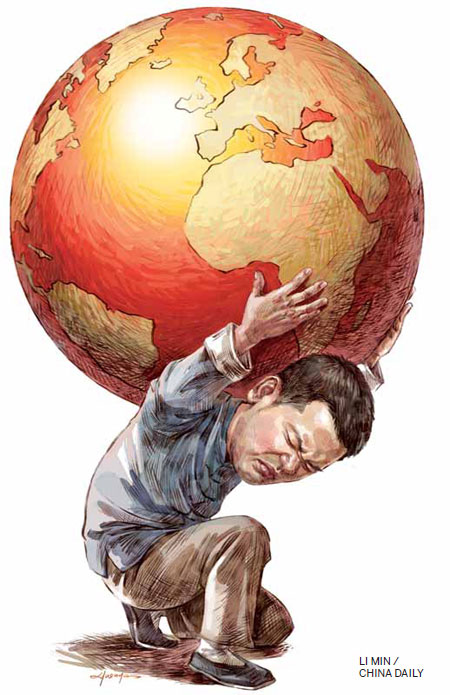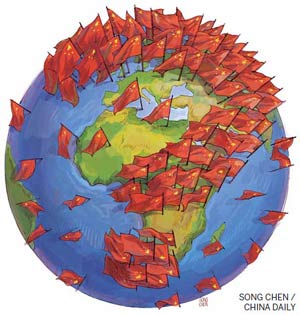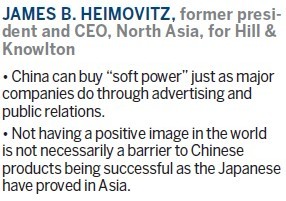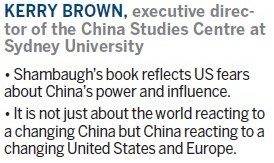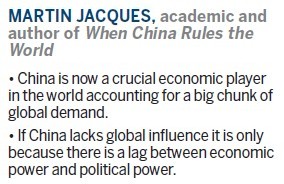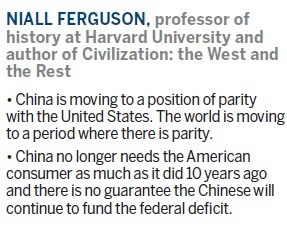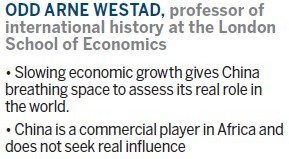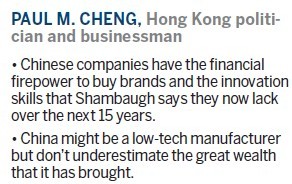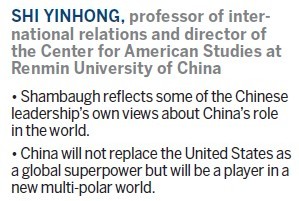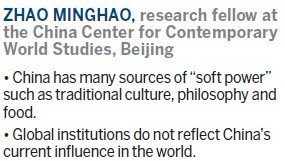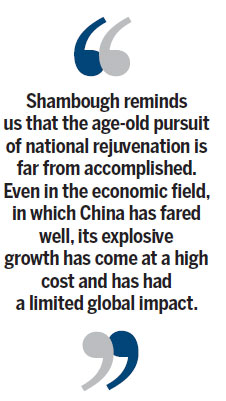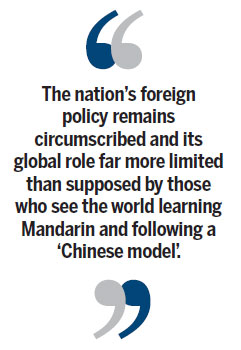|
Is China emerging as a potential global superpower or just a partial one? The leading American Sinologist David Shambaugh makes the case in his new book, China Goes Global: The Partial Power, that despite being the world's second-largest economy, the country has a long way to go before it begins to shape the world in its own image. Even in the economic sphere, where China arguably had its most significant influence - accounting for 40 percent of global growth over the past two decades as well as being the largest exporter and holder of foreign exchange reserves - its global reach is overstated, according to Shambaugh. The American academic argues that while the image is of Chinese companies taking over businesses throughout Europe and the United States, China has only the fifth largest overseas direct investment in the world, behind even the Netherlands and a fifth of the size of that of the United States. He further points out that while China may have 71 companies in the Fortune 500 only three of them are truly multinational, gaining more than 50 percent of their revenues from overseas. China, according to the professor of political science and international affairs at George Washington University, is also a "cautious diplomatic actor", using diplomacy mainly as a tool to serve its own economic modernization and national security and not for any wider goals. "China has a very long way to go before it becomes - if it ever becomes - a true global power. And it will never 'rule the world'," he argues. The book, coming from one of the West's leading Sinologists, is already fueling a debate about China's current and future role in the world. Some in China insist it has never been China's intention to be a world superpower and that its sudden economic advancement has put it in a position of having to have a global role it never really sought in the first place. Many believe Shambaugh also fails to give sufficient credit for the long and difficult journey China has taken since reform and opening-up began under Deng Xiaoping in the late 1970s. The American Sinologist seems to be taking the polar opposite stance of the British academic Martin Jacques, who in his international bestseller When China Rules the World postulated that in the 21st century it might be China that defines modernity and not the United States. Speaking from Kuala Lumpur, Jacques says Shambaugh's book is more about where China is now than where it is heading. "It is a still photo. As a snapshot of the present he has got a lot to say and he has some very reasonable arguments but he underplays the scale of China's achievement. "Where he really does underestimate China's strength is in the whole economic field. China is an absolutely crucial player and has become an important source of demand in the world not just for commodities but as a major consumer market in its own right.
Paul M. Cheng, the Hong Kong politician and businessman, speaking from Hawaii, also believes Shambaugh has taken a snapshot and underestimates the global impact Chinese companies are likely to have over the next ten to 15 years. The author of On Equal Terms: Redefining China's Relationship with America and the West, another book that examined China's role in the world, says China's fast developing private equity market in Hong Kong and Shanghai will give Chinese companies huge financial firepower to make acquisitions around the world. They will then be able to acquire the innovation capability and global brands that Shambaugh says the China economy now lacks. "It is a fast track way for Chinese companies to do this. You can criticize them for not being able to do it themselves but from a business point of view it really makes no difference," he says. Cheng says Shambaugh is right to highlight that, according to the WTO, 93.6 percent of China's exports are still manufactured, often low-end, goods but fails to appreciate how much money it has made doing this. "I know where he is coming from. A lot of Chinese companies just make OEM products for other companies and are not very innovative in their own right," he says. "That is fair comment but they are making a lot of money making these products and all this wealth they have accumulated will take them to the next stage." [Full story] |
| EXPERTS' PANEL |
|
 |
 |
|
 |
 |
|
 |
 |
|
 |
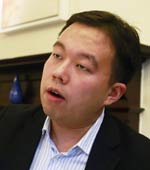 |
|
RELATED STORIES | |
|
Soft power better than hard approach World wants to see a healthy China economy |
|
|
Despite being the world's second-largest economy, he insists it still doesn't have the sort of influence the United States, and the West generally, has to shape the world. "Is China a global power or not? A major power has influence over any domain. If you have influence, you are setting standards, shaping events and shaping the actions of others. By all of these measures I find China a partial power at best," he says. Shambaugh, professor of political science and international affairs at George Washington University and a leading Sinologist, was speaking in the late evening sun of the courtyard Holiday Inn Express in Dongzhimen. He was in Beijing to promote his new book, China Goes Global: The Partial Power, one of the major books on China this year. While the popular perception might be that China has had the deep pockets to keep the world afloat since the financial crisis and that its companies are making acquisitions around the world, the reality, according to Shambaugh, is somewhat different. "China's ODI was $77.2 billion last year. That ranked China, the world's second-largest economy, at No 5 in the world. The Netherlands exports more capital than China does. If you look at the destinations of China's ODI, four of the top five locations are tax havens. It is money that is being parked abroad," he says. Shambaugh says that few Chinese companies - apart from telecommunications giant Huawei, electronics goods maker Haier, computer company Lenovo and state-owned oil companies CNOOC and Sinopec - have had much impact in overseas markets. He points out that of the 71 Chinese companies in this year's Fortune 500, only three make more than 50 percent of their revenues outside of China. "They are not really multinational corporations. They are Chinese companies which make most of their money in China." Shambaugh, who speaks fluent Chinese which he sometimes intersperses with English, has taken five years to write the book, including one year at the Academy of Social Sciences Institute of World Economics and Politics, part of the Chinese Academy of Social Sciences (CASS), the Chinese government think tank. [Full story]
|
| TWO VIEWS |
|
Damping down China's rejuvenation By Cheng Xiaohe A NEW BOOK ASKS NOT WHEN THE CHINESE WILL RULE THE WORLD BUT WHETHER THEY WILL EVER GET TO THE TOP In his well-known book, When China Rules the World: The End of the Western World and the Birth of a New Global Order, Martin Jacques claims that China's impact on the world will be profound, and in the long term China will seek "to transform that system while at the same time, in effect, sponsoring a new China-centric international system which will exist alongside the present system and probably slowly begin to usurp it". Jacques' bullish statement raises the expectation that China may come to dominate the world in the not-too-distant future. However, David Shambough, a leading expert in the field of contemporary China studies in the United States, pours cold water on such an upbeat sentiment. In his newly released book, China Goes Global: the Partial Power, Shambough systematically examines China's global impact in economic, political, military and cultural fields.
As a thoughtful scholar, Shambough's sector-by-sector diagnosis is incisive, straightforward and even inspiring to some Chinese, who truly cheer their nation as a rising great power. But he also believes China is a reactive, lonely power and has "very little influence on global cultural trends, minimal soft power and a mixed-to-poor international image". [Full story] [The author is deputy director of the Center for China's International Strategic Studies at Renmin University of China.] |
Stepping out of the comfort zone By Jonathan Fenby CHINA MUST SHED ITS RELUCTANCE AND START PLAYING A MUCH BIGGER ROLE IN GLOBAL AFFAIRS China's economic expansion and emergence on to the world scene has been the most important development since the end of the Cold War leading some commentators to conclude that the 21st century belongs to the People's Republic or, simply, that China will rule the world. Such predictions are likely to prove mistaken, not simply because the economic projections on which they are based are changing but also because of the underlying question of whether China wants to play such a role. Of course, China has established itself as a huge player in regions where its investments and purchases of raw materials provide a significant boost to the incomes of countries ranging from Australia to Angola, Brazil to Iran. With its worldwide investments, a permanent seat on the UN Security Council, nuclear weapons, its contributions of troops to UN peacekeeping forces and the network of Confucius Institutes spreading the cultural message, China's geopolitical place might seem assured.
Though the step may meet China's short-term interests, it hardly constitutes a coherent foreign policy for a global giant. Complaining about operating in a world system with rules set before it became involved, Beijing has come up with few initiatives to reform the way global finance or politics work. It operates bilaterally, be it with countries in Southeast Asia or the providers of its raw materials. Its relations are scratchy with the other two major Asian powers, Japan and India. [Full story] [Jonathan Fenby is the author of seven books on China, including the recent Tiger Head, Snake Tails and China Today.] |
|
RELATED STORIES | |
|
Soft power better than hard approach World wants to see a healthy China economy |
|
